Why Raspberries Are a Superfood: Boost Your Health One Berry at a Time
Published: April 2, 2025 at 4:33:02 PM UTC
Last updated: January 2, 2026 at 6:05:21 PM UTC
Raspberries are not just tasty but also packed with health benefits. They are low in calories and rich in nutrients. This makes them a great choice for anyone wanting to boost their health. In this article, we'll explore the many health perks of raspberries. We'll see how these small fruits can make a big difference in your diet.
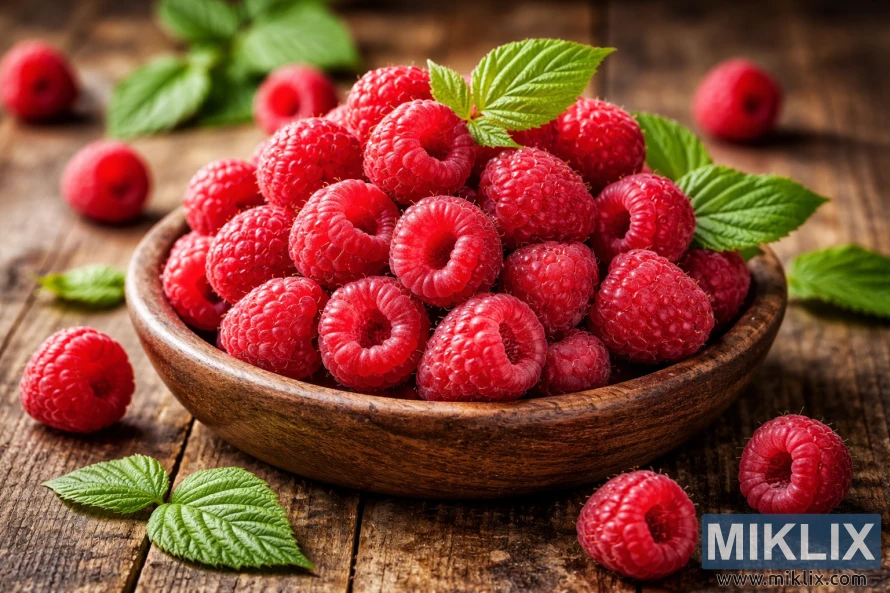
Key Takeaways
- Raspberries are low in calories and high in nutritional value.
- They are loaded with antioxidants that help combat oxidative stress.
- Including raspberries in your diet can support weight management.
- Raspberries can play a role in diabetes management and blood sugar control.
- They contribute to skin health and may offer anti-aging benefits.
- Incorporating raspberries into meals and snacks is easy and enjoyable.
Introduction to Raspberries
Raspberries are small fruits known for their bright colors and tangy taste. They belong to the Rubus genus and come in different types. Each variety offers a unique taste and use in cooking.
The main types are red, black, purple, and gold. Red raspberries are the most common and can be found in most stores. Black raspberries are sweeter, while purple and gold offer new flavors to try.
Fresh raspberries are available from June to October. But, frozen raspberries are a great choice all year round. They are packed with vitamins, fiber, and antioxidants, making them a healthy snack.
They can be enjoyed in many ways, like in smoothies or salads. This makes them a favorite for many.
Nutritional Profile of Raspberries
A one-cup (123-gram) serving of red raspberries is packed with nutritional information. It has about 64 calories and 14.7 grams of carbohydrates. Raspberries are also high in fiber, with 8 grams per serving. This makes them a great choice for those looking for healthy options.
Raspberries are full of vitamins in raspberries. They give you more than 50% of the daily Vitamin C you need. Vitamin C is key for a strong immune system. Plus, raspberries are a good source of manganese, important for the body's functions.
Other important nutrients in raspberries include:
- Vitamin K, essential for blood clotting and bone health
- B vitamins, which contribute to energy metabolism
- Minerals such as potassium and magnesium, vital for muscle function and nerve health
The nutritional profile of raspberries shows they are more than just a tasty fruit. They are a powerhouse of health benefits.
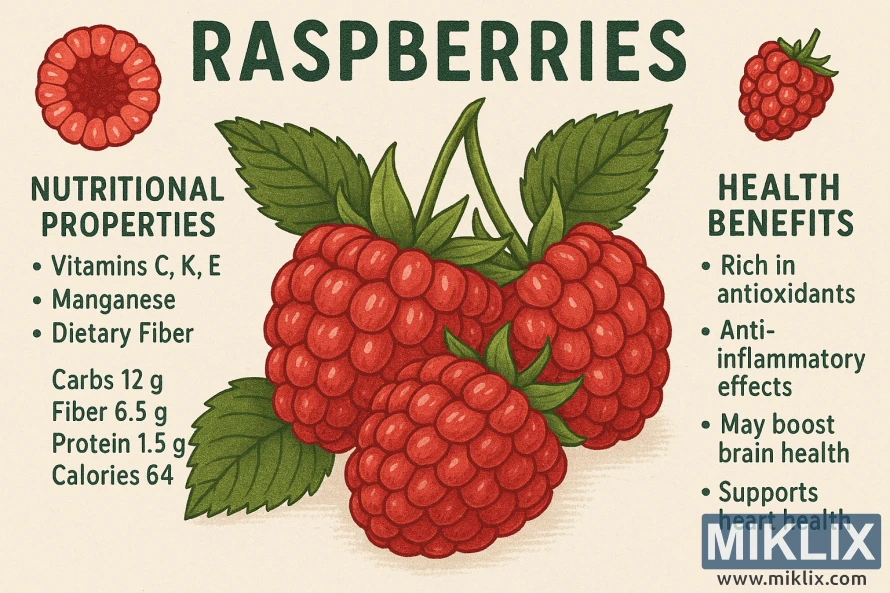
Health Benefits of Raspberries
Raspberries are not just tasty; they're also good for you. They're full of antioxidants that fight off harmful stress and inflammation. Plus, they're high in fiber, which is great for your digestive health.
These berries are also good for your heart. They have vitamins and minerals that keep your heart working well. Eating raspberries can also help you manage your weight by keeping you full longer.
Adding raspberries to your meals makes them more flavorful and nutritious. They protect your cells and help with weight control. So, it's clear why raspberries are so beneficial for your health.
Weight Management and Raspberries
Raspberries are great for those trying to lose weight. They have only 64 calories in a cup. Plus, they're full of fiber, which helps you feel full longer.
Raspberries are also very watery, with over 85% water. This makes them very filling without adding too many calories. Eating raspberries instead of junk food can help you eat less. It's a sweet way to support your weight loss journey.
Diabetes Management and Blood Sugar Control
Raspberries are great for managing diabetes. They have only 5 grams of sugar per cup. This makes them perfect for keeping blood sugar levels in check.
The glycemic index of raspberries is low. This means they don't cause big spikes in blood sugar. They're a good choice for those with diabetes.
Raspberries are also high in fiber. Fiber helps slow down sugar absorption. This keeps blood sugar levels stable. Studies show raspberries might even improve insulin sensitivity, which is key for diabetes management.
Adding raspberries to your diet is a tasty way to support your health. You can enjoy them fresh, in smoothies, or in many recipes. They help manage diabetes while being a sweet treat.
Raspberries and Disease Prevention
Raspberries are packed with health benefits that help prevent diseases. They have lots of antioxidants that fight oxidative stress. This can lower the risk of chronic diseases like cancer and heart problems.
Eating raspberries can protect you from certain health risks. These include:
- Lowering the risk of cancer through free radical scavenging.
- Reducing inflammation that may lead to heart disease.
- Offering neuroprotective benefits that may help in preventing Alzheimer's disease.
- Assisting in managing diabetes by stabilizing blood sugar levels.
The antioxidants in raspberries boost your health and immune system. Eating raspberries regularly can help fight off many health risks. Adding raspberries to your meals makes them tasty and improves your long-term health.
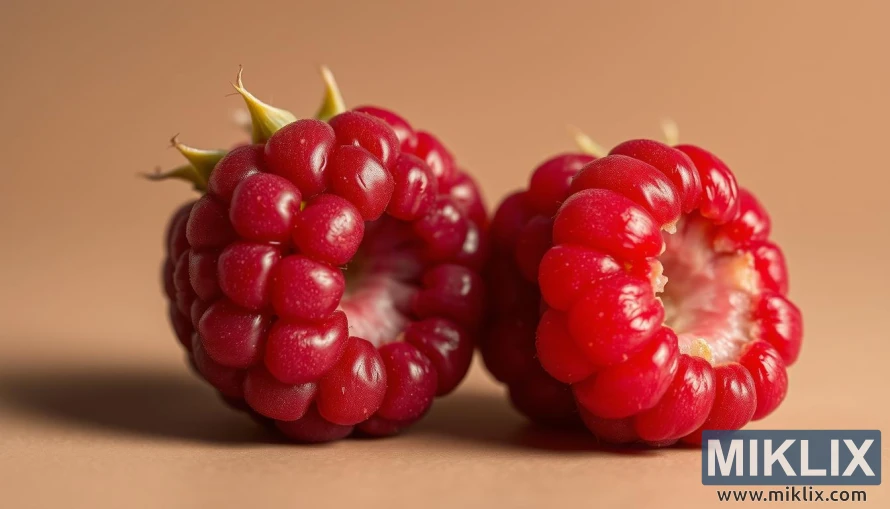
Skin Health and Anti-Aging Benefits of Raspberries
Raspberries are great for your skin, thanks to their Vitamin C. This vitamin helps make collagen, which keeps your skin elastic and smooth. As we get older, our bodies make less collagen, so eating foods like raspberries is key.
Raspberries also have antioxidants that fight off stress and inflammation. This helps your skin look younger and healthier. Eating raspberries often can make your skin stronger and more vibrant.
Ways to Incorporate Raspberries into Your Diet
Adding raspberries to your diet is easy and fun. These colorful berries can be enjoyed in many ways. They make any meal more exciting. Fresh raspberries are great for snacking, full of taste and health benefits.
Here are some creative ways to enjoy raspberries:
- Add fresh raspberries to your morning cereal or oatmeal for a fruity twist.
- Blend them into smoothies for a refreshing beverage full of antioxidants.
- Top your favorite yogurt with raspberries for a delicious breakfast or snack.
Raspberries can also make savory dishes better. Try adding them to salads for a sweet surprise. They're also great in desserts like tarts or muffins.
If you like cooking, try making jams or sauces with raspberries. These homemade treats are perfect on toast or pancakes. The options for raspberry snacks are endless and suit every taste!
Potential Risks of Eating Raspberries
Raspberries are tasty and full of nutrients. But, it's key to know the risks they might pose. Some people might have an allergy to raspberries, leading to mild or severe reactions. Symptoms can range from itchy skin to stomach issues.
It's also important to think about food safety with raspberries. If not washed right, they can carry harmful bacteria. This includes E. coli or Salmonella. To stay safe, wash raspberries well under cold water and dry them with a clean towel.
In short, raspberries are good for you but be careful. Knowing about allergies and food safety is vital. By washing them properly, you can avoid foodborne illnesses.
How to Store Raspberries for Maximum Freshness
Fresh raspberries taste amazing but don't last long. To keep them fresh, you need to store them right. It's best to eat them within one to two days for the best taste and texture. Here are some tips for storing raspberries:
- Keep them refrigerated. Use a breathable container, like a berry basket or a bowl lined with paper towels, to avoid moisture.
- Don't wash them until you're ready to eat them. Too much water can make them spoil faster.
- Check the berries often. Take out any bad ones to keep the rest fresh.
If you want to keep them longer, freezing is a good option. Frozen raspberries stay nutritious for smoothies, desserts, or other recipes. To freeze, put the berries on a baking sheet until they're solid. Then, move them to an airtight container or freezer bag.
Frozen vs. Fresh Raspberries: Which is Better?
Choosing between fresh and frozen raspberries comes down to personal taste. Fresh raspberries are known for their bright flavor and soft texture. They add a burst of taste to salads, desserts, and smoothies.
But, they don't last long and can spoil in a few days. This makes them best enjoyed quickly.
Frozen raspberries, on the other hand, are a convenient choice. They're picked when ripe and frozen right away. This helps keep their nutrients intact.
Studies show frozen raspberries have similar vitamins and antioxidants as fresh ones. They're great for enjoying all year, helping you avoid waste.
So, whether you prefer fresh or frozen raspberries depends on what you value most. Fresh ones are perfect for those who love taste and texture. Frozen raspberries, with their lasting nutrition, are great for cooking and baking.
Sustainability of Raspberry Farming
Raspberry farming has changed a lot to be more sustainable. Farmers now focus on growing berries that are not only tasty but also good for the planet.
Here are some key ways raspberries are grown in an eco-friendly way:
- They use less water by improving irrigation.
- Organic fertilizers keep the soil healthy.
- They avoid harmful chemicals by using smart pest control.
- Planting cover crops and native plants boosts biodiversity.
Buying raspberries from local farmers who use these methods helps the environment. It shows that we care about our health and the planet's too. By picking eco-friendly raspberries, we make a choice that benefits everyone.
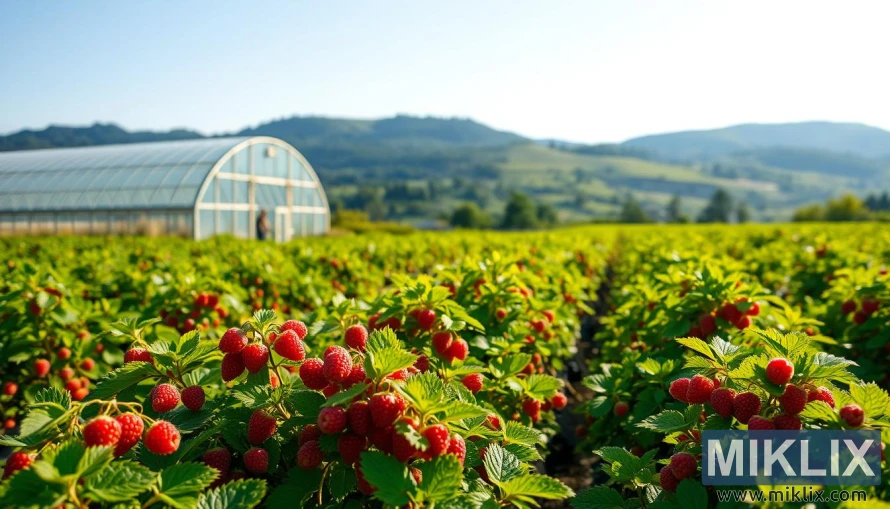
Raspberry Varieties and Their Benefits
Raspberries come in four colors: red, black, purple, and gold. Each color has its own taste and health perks. Red raspberries are sweet and tart, while black raspberries are milder and sweeter, found in North America.
Purple raspberries are a mix of red and black, combining their best traits. Golden raspberries have a unique taste, like honey and banana. All colors are packed with vitamins, minerals, antioxidants, and fiber, boosting health.
Every raspberry type is great for cooking, fresh or frozen. They're perfect for oatmeal, pancakes, and smoothies. They also add sweetness to yogurt, jams, and baked goods.
Black raspberries stand out for their antioxidants. They have more antioxidants than blueberries, helping fight diseases like cancer and heart disease. Their anthocyanins also have anti-inflammatory effects.
Black raspberries have more anthocyanins and ellagic acid than red raspberries. They have 214-589 mg of anthocyanins per 100 grams, while red raspberries have 20-65 mg. Black raspberries also have more ellagic acid, showing the benefits of different raspberry colors.
Conclusion
Raspberries are a special addition to any diet. They are full of vitamins, fiber, and antioxidants. These nutrients help with weight management, blood sugar control, and disease prevention.
Their natural sweetness makes them a tasty way to boost health and wellness. Raspberries are more than just a fruit; they're a superfood. They can help with skin health and fight aging signs.
Adding raspberries to your meals is easy and rewarding. You can put them in smoothies, on oatmeal, or just enjoy them as a snack. Raspberries are a delicious way to improve your health. So, go ahead and enjoy their taste and benefits!
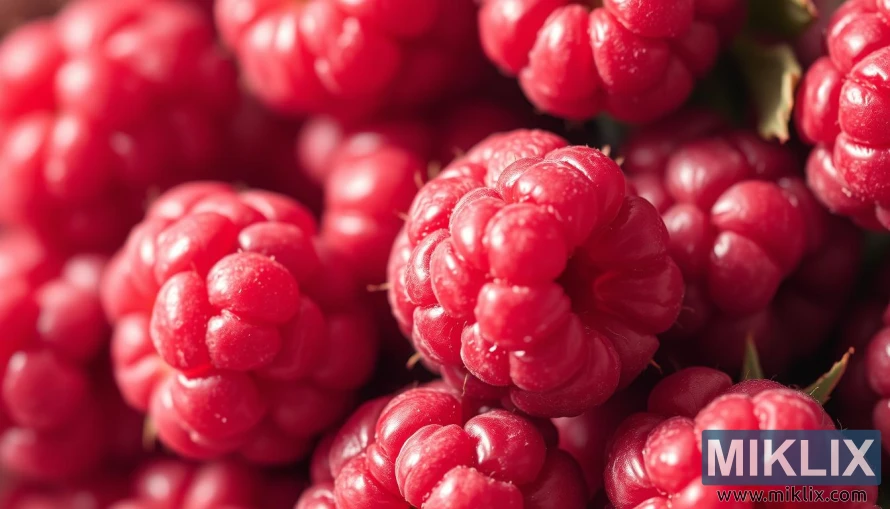
Further Reading
If you enjoyed this post, you may also like these suggestions:
- Layers of Goodness: Why Onions Are a Superfood in Disguise
- Brain Fuel in a Capsule: How Acetyl L-Carnitine Supercharges Energy and Focus
- Casein Protein: The Slow-Release Secret to All-Night Muscle Repair and Satiety
